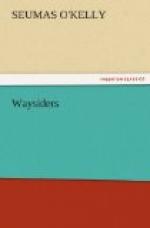Less than a mile of ground brought us to the spot where the paupers were buried. It lay behind a high wall, a narrow strip of ground, cut off from a great lord’s demesne by a wood. The scent of decay was heavy in the place; it felt as if the spring and the summer had dragged their steps here, to lie down and die with the paupers. The uncut grass lay rank and grey and long—Nature’s unkempt beard—on the earth. The great bare chestnuts and oaks threw narrow shadows over the irregular mounds of earth. Small, rude wooden crosses stood at the heads of some of the mounds, lopsided, drunken, weather-beaten. No names were inscribed upon them. All the bones laid down here were anonymous. A robin was singing at the edge of the wood; overhead the rapid wings of wild pigeons beat the air.
A stable bell rang impetuously in the distance, dismissing the workmen on the lord’s demesne. By a freshly-made grave two gravediggers were leaning on their spades. They were paupers, too; men who got some privilege for their efforts in this dark strip of earth between the wood and the wall. One of them yawned. A third man stood aloof, a minor official from the workhouse; he took a pipe from his mouth as the priest approached.
The three men gave one the feeling that they were rather tired of waiting, impatient to have their little business through. It was a weird spot in the gathering gloom of a November evening. The only bright thing in the place, the only gay spot, the only cheerful patch of colour, almost exulting in its grim surroundings, was the heap of freshly thrown up soil from the grave. It was rich in colour as newly-coined gold. Resting upon it was a clean, white, unpainted coffin. The only ornament was a tin breastplate on the lid and the inscription in black letters:
Martin Quirke,
Died November 3, 1900.
R.I.P.
The white coffin on the pile of golden earth was like the altar of some pagan god. I stood apart as the priest, vesting himself in a black stole, approached the graveside and began the recital of the burial service in Latin. The gravediggers, whose own bones would one day be interred anonymously in the same ground, stood on either side of him with their spades, two grim acolytes. The minor official from the workhouse, the symbol of the State, bared a long, narrow head, as white and as smooth as the coffin on the heap of earth. I stood by a groggy wooden cross, the eternal observer.
The priest spoke in a low monotone, holding the book close to his eyes in the uncertain light. And as he read I fell to wondering who our brother in the white coffin might be. Some merry tramp who knew the pain and the joy of the road? Some detached soul who had shaken off the burden of life’s conventions, one who loved lightly and took punishment casually? One who saw crime as a science, or merely a broken reed? Or a soldier who had carried a knapsack in foreign campaigns? A creature of empire who had found himself in Africa, or Egypt, or India, or the Crimea, and come back again to claim his pile of golden earth in the corner of the lord’s demesne? If the men had time, perhaps they would stick a little wooden cross over the spot where his bones were laid down....




